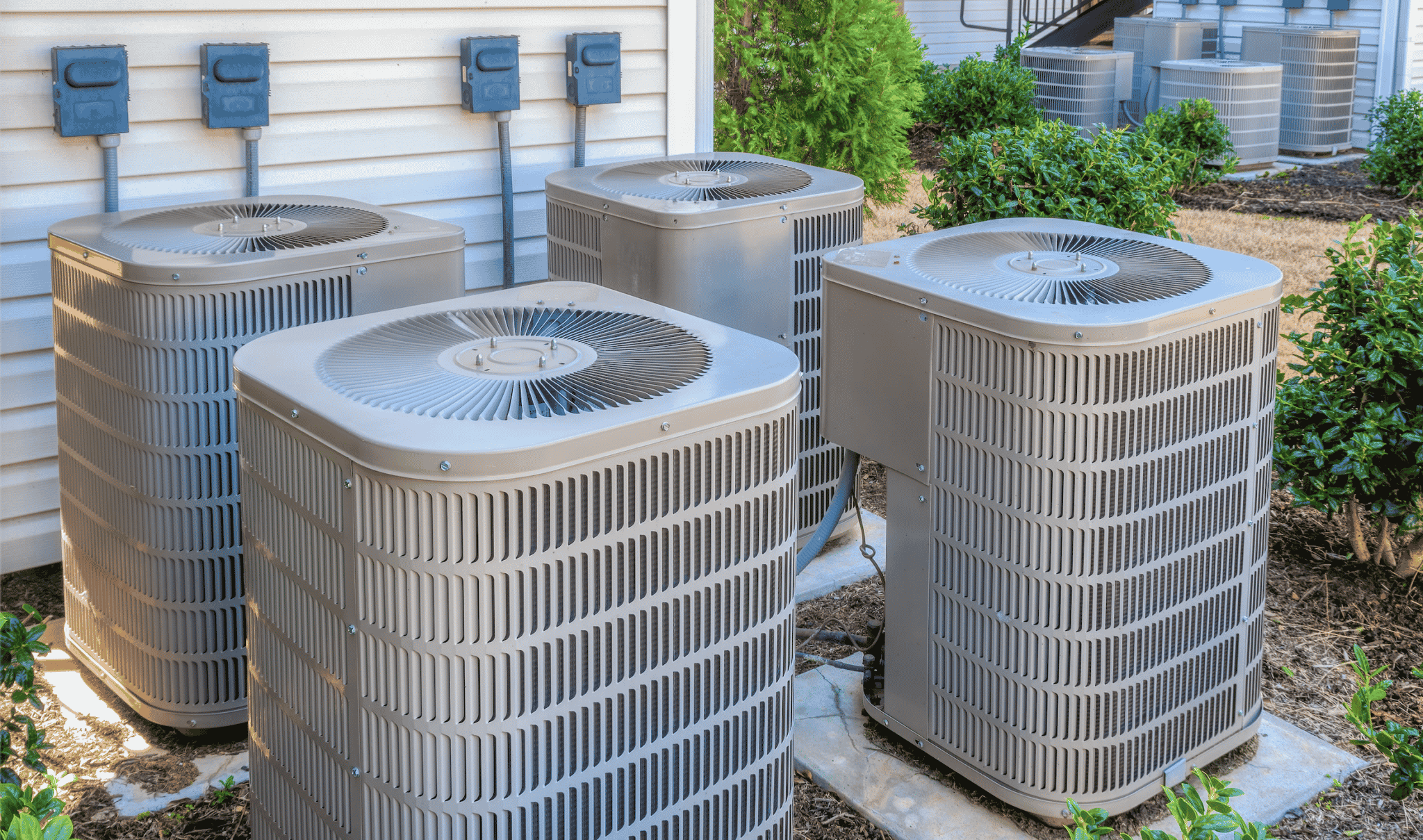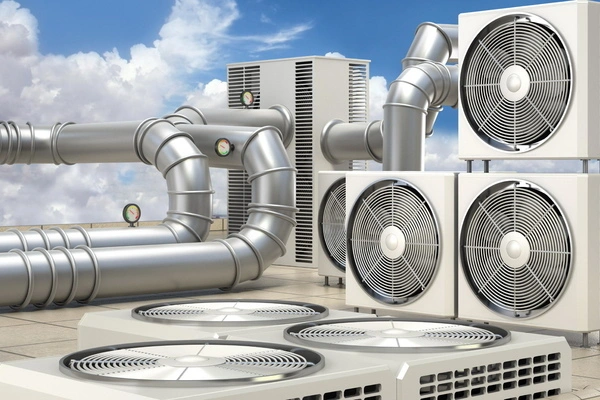Discovering the Vital Elements of an Efficient HVAC System
A reliable heating and cooling system is built on a number of crucial parts that work in harmony. Each component, from the thermostat to the ductwork, plays a crucial function in maintaining comfort and energy performance. Understanding these elements is essential for enhancing performance and enhancing interior air top quality. As one takes a look at these components, the detailed relationships between them reveal understandings into boosting total system performance. What specific aspects add most to this performance?
The Role of the Thermostat in A/c Effectiveness

Although often neglected, the thermostat plays an essential function in the effectiveness of heating and cooling systems. HVAC experts. This small tool works as the main nerve center, managing temperature level setups and making certain suitable convenience within an area. By properly noticing the ambient temperature level, the thermostat interacts with the air flow, air, and heating conditioning systems to maintain the desired environment
An effective thermostat minimizes power usage by turning on the HVAC system only when essential, consequently preventing extreme home heating or air conditioning. Modern smart and programmable thermostats enhance this effectiveness better by allowing individuals to set timetables and remotely change setups, adapting to day-to-day regimens.
Additionally, the positioning of the thermostat is necessary; improper place can bring about inaccurate temperature readings, resulting in ineffective procedure. In general, a well-functioning thermostat not just enhances comfort but additionally contributes noticeably to energy savings and the durability of the cooling and heating system.
Comprehending the Relevance of Air Filters
Air filters serve a vital feature in cooling and heating systems by assuring that the air distributing within an area remains clean and healthy. These filters catch dust, allergens, and other contaminants, avoiding them from being recirculated throughout the environment. By recording these fragments, air filters add to enhanced indoor air high quality, which can substantially benefit residents' health, particularly those with allergies or breathing conditions.
Additionally, keeping clean air filters enhances the efficiency of HVAC systems. Clogged filters can restrict air movement, creating the system to work tougher to keep wanted temperatures, resulting in boosted power usage and higher utility costs. Routinely changing or cleaning up filters is an essential maintenance action that can lengthen the life expectancy of a/c equipment. Inevitably, recognizing the value of air filters enables home owners and building managers to take positive steps to ensure a well-functioning, effective a/c system that promotes a risk-free and comfy interior environment.

The Capability of the Heating System and Heatpump
Heating systems and heatpump are critical parts of HVAC systems, in charge of supplying warmth during colder months. Heaters operate by heating air via burning or electric resistance, after that dispersing it throughout the home by means of ducts. They typically supply fast home heating and can be sustained by natural gas, power, or oil, relying on the system kind.
On the other hand, warm pumps move heat as opposed to generate it. They remove warmth from the outdoors air or ground, also in low temperatures, and move it inside. HVAC experts. This twin performance permits heat pumps to also give cooling in warmer months, making them flexible options for year-round environment control
Both systems require correct upkeep to ensure efficiency and longevity. While heaters succeed in extreme cold, heatpump can be useful in moderate environments. Understanding their unique performances aids homeowners in picking one of the most suitable alternative for their heating needs.
Checking Out the Cooling Device
The cooling system is a crucial element of cooling and heating systems, offered in numerous types to match different needs. Comprehending the performance rankings of these systems is see here now crucial for making notified choices concerning power usage and cost. This area will certainly discover the diverse kinds of air conditioning system and clarify exactly how performance ratings impact performance.
Kinds Of Air Conditioners
While various elements influence the selection of cooling systems, recognizing the various kinds available is crucial for home owners and building managers alike. Central air conditioners are developed to cool down entire homes or buildings, using a network of ducts for air movement. Window devices offer a more localized remedy, perfect for small areas or single areas. Portable a/c give versatility, enabling customers to relocate the device as needed. Ductless mini-split systems are one more option, integrating the performance of central systems with the ease of zoning, as they require no ductwork. Geothermal systems harness the planet's temperature level for energy-efficient cooling. Each kind comes with distinctive advantages, making notified choices crucial for effective climate control.

Effectiveness Rankings Discussed
Comprehending effectiveness rankings is important for choosing the right cooling device, as these metrics supply insight right into the system's performance and power intake. The most typical ranking for air conditioners is the Seasonal Power Efficiency Ratio (SEER), which measures the cooling outcome throughout a common air conditioning season divided by the complete electric power input. A greater SEER shows much better efficiency. In addition, the Energy Efficiency Ratio (EER) is made use of for determining efficiency under specific problems. One more important metric is the Power Celebrity certification, which symbolizes that a system fulfills rigorous power efficiency standards. By assessing these rankings, consumers can make enlightened options that not only enhance comfort but likewise minimize energy costs and environmental effect.
The Importance of Ductwork and Air flow
Efficient ductwork layout and air flow administration play critical roles in the total performance and efficiency of cooling and heating systems. Appropriate ductwork guarantees that conditioned air is distributed equally throughout an area, lessening temperature level variations and improving comfort. Well-designed air ducts decrease resistance to air flow, reducing the work on a/c devices and eventually decreasing energy consumption.
Air flow administration involves strategically putting vents and registers to boost the flow of air. This protects against usual issues such as cool or hot spots, which can happen when air flow is obstructed or improperly well balanced. In addition, the ideal air duct products and insulation can additionally enhance effectiveness by decreasing warm loss or gain during air transit.
An effective ductwork system not just adds to energy savings however can additionally prolong the life expectancy of heating and cooling equipment by decreasing unnecessary strain (HVAC experts). As a result, understanding the importance of ductwork and airflow is necessary for achieving peak cooling and heating system efficiency
Normal Maintenance Practices to Improve Performance
Normal maintenance practices are necessary for guaranteeing peak efficiency of HVAC systems. These methods consist of routine examinations, cleansing, and needed repair work to maintain the system running successfully. Routinely changing air filters is important, as clogged filters can block air movement and reduce effectiveness. Additionally, service technicians should inspect and tidy evaporator and condenser coils to protect against overheating and energy waste.
Annual specialist examinations are likewise recommended, as skilled technicians can recognize potential problems prior to they rise. Lubing relocating parts reduces deterioration, adding to a see here now longer lifespan for the system. Furthermore, ensuring that the thermostat works appropriately aids in keeping suitable temperature level control.

Regularly Asked Inquiries
Just how Frequently Should I Replace My Thermostat?
Thermostats should typically be replaced every 5 to ten years, depending upon use and technology advancements. Routine checks are advisable to ensure peak performance, specifically if experiencing inconsistent temperature level control or boosted energy expenses.
What Size Air Filter Is Ideal for My HVAC System?
The ideal dimension air filter for a heating and cooling system differs by system layout. Typically, it's important to speak with the proprietor's guidebook or examine the existing filter measurements to assure peak performance and air top quality.
Can I Mount a Heatpump Myself?
Setting up a heat pump independently is feasible for skilled people, yet it needs knowledge of neighborhood codes and electric systems. Employing an expert is advised to guarantee appropriate setup and ideal system performance.
How Do I Know if My Ductwork Is Effective?
To figure out ductwork efficiency, one must look for leaks, measure airflow at vents, inspect insulation quality, and assess temperature differences in between supply and return air ducts. Expert evaluations can supply detailed understandings right into general performance.
What Are Indicators My A/c Requirements Immediate Maintenance?
Indications that an a/c system needs instant upkeep include uncommon noises, inconsistent temperature levels, boosted energy costs, unpleasant odors, and regular cycling. Dealing with these issues immediately can prevent further damage and guarantee top system efficiency.
Air filters serve a crucial HVAC experts feature in Heating and cooling systems by guaranteeing that the air distributing within an area remains clean and healthy. Furthermore, preserving tidy air filters enhances the performance of Cooling and heating systems. Ductless mini-split systems are one more option, combining the effectiveness of central systems with the benefit of zoning, as they require no ductwork. Recognizing efficiency scores is vital for picking the appropriate air conditioning device, as these metrics offer understanding into the system's efficiency and energy usage. The ideal size air filter for a Cooling and heating system differs by unit design.